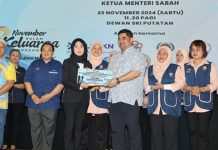KOTA KINABALU: The Agriculture and Fisheries Ministry is looking for ways to double the current food production in Sabah as it races towards achieving 60% in food production by 2030.
Deputy Chief Minister Datuk Seri Panglima Dr Jeffrey G Kitingan said at the moment, Sabah is producing only 25% of its food needs.
“Whether or not the target is realistic, that is the goal we are aiming for. I believe it is better to aim high so that we are motivated and forced to do something drastic to achieve that goal,” he said after touring Sabah Agriculture Park in Tenom on Friday.
Kitingan, who is also the Agriculture and Fisheries Minister, said one way to achieve the target is to double yields on existing farms by introducing high yield seeds and superior fruit species.
He stated that the Sabah Agriculture Department has been distributing the superior Tuaran Rice 8 (TR8) seeds to farmers, which has resulted in more than double paddy yield.
“The TR8 is already modernising paddy planting, and we aim to make the seeds widely available to all paddy farmers in Sabah. The TR8 demonstrates that it is possible to increase production without increasing acreage.
“Researchers at the Agriculture Research Section (ARS) in Tenom have also studied various herbs and fruits to be introduced to the Sabah agriculture scene and hopefully, make them available in our local markets.
“I am impressed with their findings, and I believe these products have the potential to make Sabah a major player in exotic food production one day,” he said.
Despite these new findings that could double food production, he believed Sabah would eventually need to increase the acreage of land used for food cultivation to meet future demands.
Oil palm currently occupies 1.8 million hectares of agricultural land in Sabah. In comparison, the 93,000 hectares used for food crops are insignificant.
“Out of these 93,000 hectares, only 35,000 hectares are used for paddy cultivation. So, what is the way forward? One option is to discuss with oil palm companies that have huge land about dedicating 10% of their land for food crops.
“This is something we can consider since 10% is equivalent to 180,000 hectares of food crop, where we can plant anything from paddy to corn, fruits, vegetables, and so on.
“I believe it would also be prudent to encourage intercropping in oil palm plantations, but I think this would require additional research,” he said.
Overall, Kitingan said he is satisfied with the visit and expressed interest in visiting other agricultural facilities throughout Sabah as the ministry seeks new ideas on how to fulfil its objectives.-pr,/BNN






